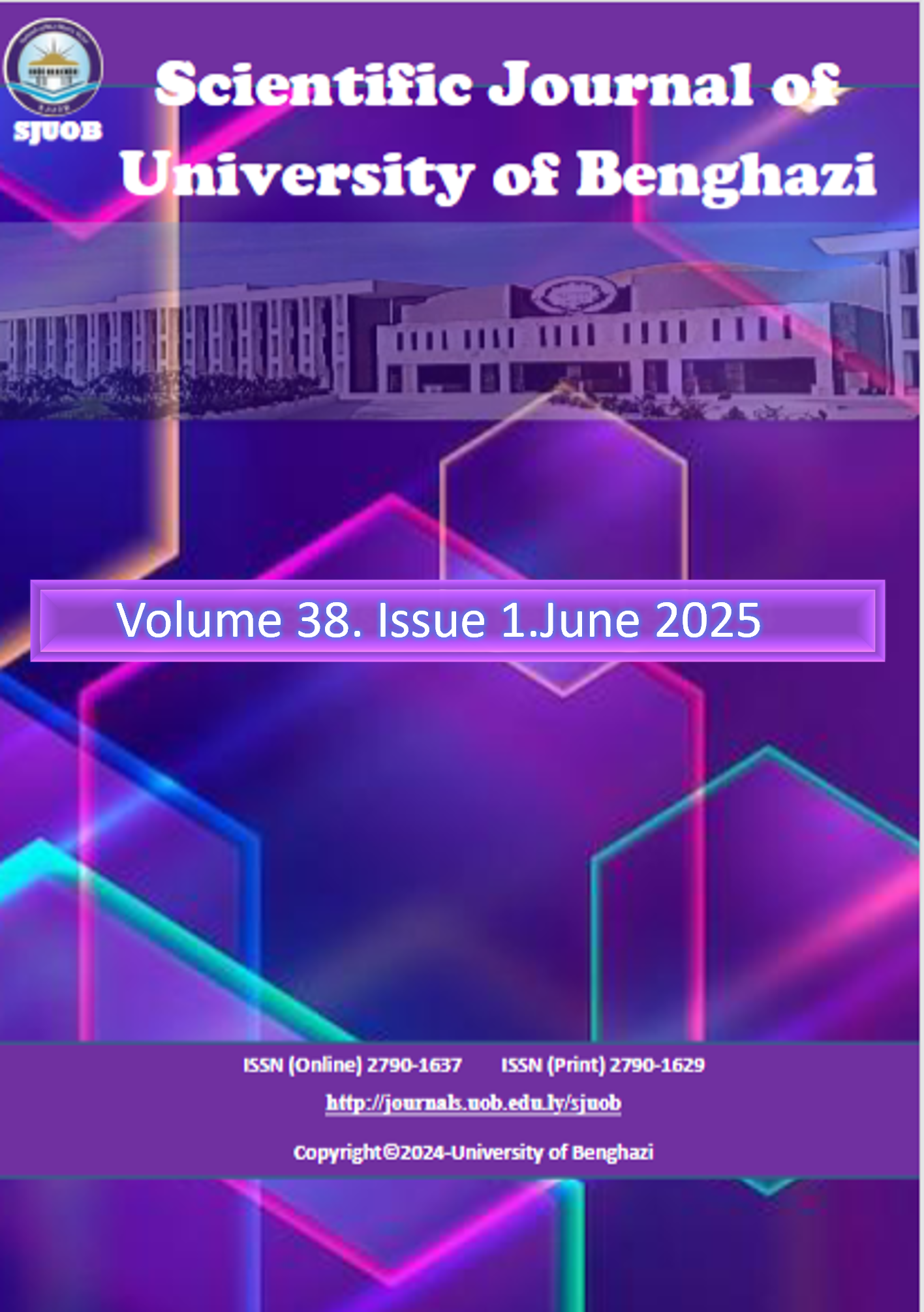Effect of socio-demographic Factors and Dietary Behavior on psychological well-being, and mental distress among Adolescents in Benghazi
DOI:
https://doi.org/10.37376/sjuob.v38i1.7332Keywords:
Dietary behavior, psychological well-being, mental distress, Adolescent nutrition, LibyaAbstract
Despite the growing awareness of the importance of nutrition for overall health, the relationship between dietary habits and mental well-being in adolescents remains understudied. This gap in knowledge poses a significant concern, as adolescence is a critical period for developing healthy eating patterns and reducing the risk of mental health issues. This study is aimed to investigate the associations between adolescents’ dietary behaviors, psychological well-being, and levels of mental distress in Benghazi, Libya. A cross-sectional descriptive design was employed, involving 391 students (189 (48.6%) boys, 202 (51.4%) girls) from 7 randomly selected secondary schools. Data collection utilized structured questionnaires assessing dietary patterns, psychological well-being, and mental distress indicators. The study revealed a significant association between dietary habits and adolescent mental health outcomes. Regular breakfast consumption, correlated positively with perceived health and sleep satisfaction (P-value 0.000). However, no significant associations were found between happiness and fruit, soft drinks, or fast-food consumption. Higher physical activity levels were consistently linked with better mental well-being (P-value 0.000), while gender differences were evident in stress and depression prevalence. Balanced eating—especially frequent breakfast—and regular physical activity are strongly linked to better psychological well-being and lower mental distress in Libyan adolescents. Nutrition interventions promoting these behaviors may help mitigate the risk of stress and depression during this critical developmental stage.Downloads
References
Hong SA, Peltzer K. Dietary behaviour, psychological well-being and mental distress among adolescents in Korea. Child and adolescent psychiatry and mental health. 2017 Dec;11(1):1-2. DOI 10.1186/s13034-017-0194-z
Puloka I, Utter J, Denny S, Fleming T. Dietary behaviours and the mental well‐being of New Zealand adolescents. Journal of paediatrics and child health. 2017 Jul;53(7):657-62.DOI: https://doi.org/10.1111/jpc.13524
Lerner RM, Boyd MJ, Du D. Adolescent development. The corsini encyclopedia of psychology. 2010 Jan 30:1-2. DOI https://doi.org/10.1002/9780470479216.corpsy0019
Lassi Z, Moin A, Bhutta Z. Nutrition in middle childhood and adolescence. Disease Control Priorities, (Volume 8): Child and Adolescent Health and Development. 2017 Nov 20:1896. DOI: 10.1596/978-1-4648-0423-6_ch11.
Heslin AM, McNulty B. Adolescent nutrition and health: Characteristics, risk factors and opportunities of an overlooked life stage. Proceedings of the Nutrition Society. 2023 May;82(2):142-56. doi: 10.1017/S0029665123002689.
Granero R. Role of Nutrition and Diet on Healthy Mental State. Nutrients. 2022 Feb 10;14(4):750.DOI: https://doi.org/10.3390/nu14040750.
Peltzer K, Pengpid S. Dietary behaviors, psychological well-being, and mental distress among university students in ASEAN. Iranian Journal of Psychiatry and Behavioral Sciences. 2017 Jun 30;11(2).DOI: https://doi.org/10.5812/ijpbs.10118
Firth J, Gangwisch JE, Borsini A, Wootton RE, Mayer EA. Food and mood: how do diet and nutrition affect mental wellbeing?. Bmj. 2020 Jun 29;369. doi: https://doi.org/10.1136/bmj.m2382
Muscaritoli M. The impact of nutrients on mental health and well-being: insights from the literature. Frontiers in nutrition. 2021:97.DOI:https://doi.org/10.3389/fnut.2021.656290
World Health Organization. Mental health of adolescents. https://www.who.int/news-room/fact-sheets/detail/adolescent-mental-health (2023).
Shawon MS, Rouf RR, Jahan E, Hossain FB, Mahmood S, Gupta RD, Islam MI, Al Kibria GM, Islam S. The burden of psychological distress and unhealthy dietary behaviours among 222,401 school-going adolescents from 61 countries. Scientific Reports. 2023 Dec 11;13(1):21894. DOI: https://doi.org/10.1038/s41598-023-49500-8
Blanchflower DG, Oswald AJ, Stewart-Brown S. Is psychological well-being linked to the consumption of fruit and vegetables?. Social Indicators Research. 2013 Dec;114:785-801. doi:10.3386/w18469
Hayhoe R, Rechel B, Clark AB, Gummerson C, Smith SL, Welch AA. Cross-sectional associations of schoolchildren’s fruit and vegetable consumption, and meal choices, with their mental well-being: a cross-sectional study. BMJ Nutrition, Prevention & Health. 2021;4(2):447. doi: 10.1136/bmjnph-2020-000205
Weng TT, Hao JH, Qian QW, Cao H, Fu JL, Sun Y, Huang L, Tao FB. Is there any relationship between dietary patterns and depression and anxiety in Chinese adolescents?. Public health nutrition. 2012 Apr;15(4):673-82. DOI: https://doi.org/10.1017/S1368980011003077
Zahedi H, Kelishadi R, Heshmat R, Motlagh ME, Ranjbar SH, Ardalan G, Payab M, Chinian M, Asayesh H, Larijani B, Qorbani M. Association between junk food consumption and mental health in a national sample of Iranian children and adolescents: the CASPIAN-IV study. Nutrition. 2014 Nov 1;30(11-12):1391-7. DOI: 10.1016/j.nut.2014.04.014
Tajik E, Awang H, Nur’Asyura AS, Chin YS, Shah AB, Koh CH, Hariz CG. Unhealthy diet practice and symptoms of stress and depression among adolescents in Pasir Gudang, Malaysia. Obesity research & clinical practice. 2016 Mar 1;10(2):114-23. DOI: 10.1016/j.orcp.2015.06.001
Weng TT, Hao JH, Qian QW, Cao H, Fu JL, Sun Y, Huang L, Tao FB. Is there any relationship between dietary patterns and depression and anxiety in Chinese adolescents?. Public health nutrition. 2012 Apr;15(4):673-82. DOI: 10.1017/S1368980011003077
Baz SS, Malibarey WM, Alsalmi HA, Alzaydi MD, Alqahtani AM, Alghamdi RY, Baz Sr SS, Malibarey II WM, Alsalmi Sr H, Alghamdi R. The Impact of a Healthy Lifestyle on Psychological Well-Being Among Saudi Adolescent Girls Attending Secondary Schools in Taif City, Saudi Arabia. Cureus. 2023 Dec 8;15(12). DOI: 10.7759/cureus.50189
Zierle-Ghosh A, Jan A. Physiology, body mass index.2018
WHO O. WHO guidelines on physical activity and sedentary behaviour. Geneva: World Health Organization. 2020 Apr 21:1-582.
Currie C, Zanotti C, Morgan A, Currie D, De Looze M, Roberts C, Samdal O, Smith OR, Barnekow V. Social determinants of health and well-being among young people. Health Behaviour in School-aged Children (HBSC) study: international report from the. 2009;2010:271.
Downloads
Published
How to Cite
License
Copyright (c) 2025 Scientific Journal of University of Benghazi

This work is licensed under a Creative Commons Attribution-NonCommercial-NoDerivatives 4.0 International License.



















